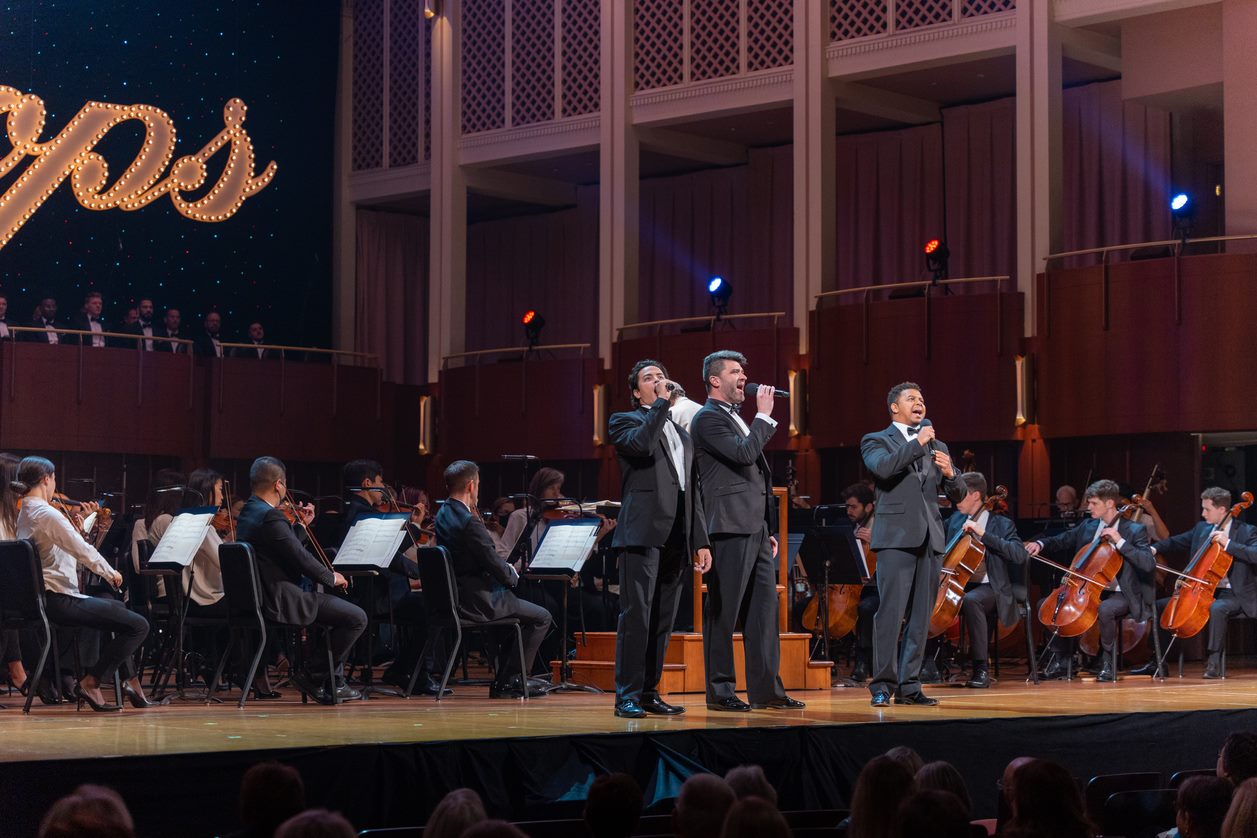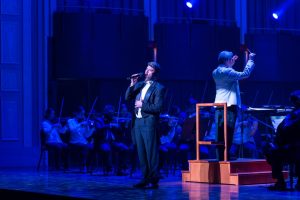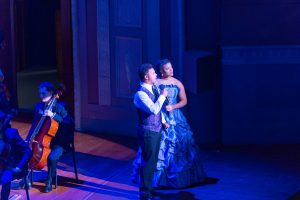
L-R Jacob Dickey, Ben Crawford & Victor Robinson with the Indianapolis Symphony Orchestra, Jack Everly, artistic director- Courtesy of Tom Russo. Used with permission.
I thoroughly enjoyed the Indianapolis Symphony Orchestra Pops concert “Leading Men of Broadway,” presented Saturday at Hilbert Circle Theatre, on so many levels. First of all, musicals are my favorite performing arts form. Secondly, no one interprets the Broadway repertoire better than ISO Pops maestro Jack Everly, who has conducted in Broadway pits himself. Thirdly, Broadway performers are remarkable vocalists, and lastly, the highly regarded Indianapolis Men’s Chorus were also featured. To top it off, the program featured many favorite musicals I have seen over my numerous years as a reviewer, both on Broadway and even some seen multiple times on regional and local stages.

Ben Crawford – Courtesy of Tom Russo. Used with permission.
The premiere vocalists, all with prestigious credentials and in possession of powerhouse instruments, included Ben Crawford, currently starring in “Phantom of the Opera,” Jacob Dickey, last seen in the hit revival of “Company,” Shereen Pimentel, who starred in the 2020 revival of “West Side Story,” and Victor Ryan Robinson, who made his 2018 Met Opera, Broadway, and Kennedy Center debut all in the same season.
Setting the tone for the feast that was to come, the ISO, led by the effervescent Everly, dazzled in an overture consisting of “Stouthearted Men,” “I Am What I Am,” “If I Were a Rich Man,” “Where Is the Life That I Once Led,” “Old Man River,” “I’ve Grown Accustomed to Her Face,” and “The Impossible Dream.”
As is typical with artistic director Everly, the program, which featured many of his inspired arrangements, was impeccable in its variety and representation of the uniquely American musical genre. For a musical lover like me and based on my observation of the mostly baby boomer audience, who seemed equally captivated as I was, there simply was not a lull in the concert or any throw away selection to be had. Then, of course, there was the wall of sound emanating from the 84 ISO musicians, the four vocalists, and 50 IMC singers. The effect was one of total envelopment and immersion in the grand and expansive creations of many of the world’s most iconic musical composers. Though it would have been impossible to include all the greats, my only regret is that the music of one of my favorites, Stephen Sondheim, was not represented.
Act 1 highlights included Dickey reprising “Proud of Your Boy,” a song he sang in “Aladdin,” Crawford singing, “If I Can’t Love Her,” from “Beauty and the Beast,” and Pimental performing “Gimme, Gimme” from “Thoroughly Modern Millie.” The gifted soprano also shined in a duet of “Wheels of a Dream,” from “Ragtime” with dynamic tenor Peterson. Closing the act with an undeniable flourish, the ISO performed a rapturous medley that included “Guys and Dolls,” “Oh, what a Beautiful Mornin,’” “I Have Dreamed,” “Summer Nights,” and several others.
Act 2 featured 12 IMC singers, who joined the four vocalists for the remainder of the concert. Deserving of plaudits for their vocal richness were Garrett Godsey, Johnnie Hughes, Jackson Lee, Jared McElroy, Edric Mitchell, Aaron Munson, Drew Kempin, Joseph Perkins, Jr., Daniel Stevenson, and Patrick Wagner. Though mostly avocational signers, the quality of their vocals was as professional sounding as that of their celebrated counterparts on stage. Responsible for that caliber is IMC artistic director, Greg Sanders, a pianist-arranger, orchestrator-educator who serves as the vocal director of all ISO Pops productions, including the annual “Yuletide” celebrations.
In a concert brimming with dramatic appeal, the second half of the concert reached the heights with the inclusion of selections from the musical theatre canon that included: Pimentel singing “Till There Was You,” from “The Music Man,” “My Shot” from “Hamilton,” which Dickey and an IMC small group sang, and “Music of The Night,” from “Phantom,” masterfully intoned by Crawford, which he told the audience he has performed one thousand times. The previously mentioned wall of sound pervaded the hall in full force during the concert’s conclusion when the featured vocalists, IMC, and the ISO combined to perform a medley from “Les Misérables” by Claude-Michel Schönberg and Alain Boubil.

L-R Victor Ryan Robertson & Shereen Pimental – Courtesy of Tom Russo. Used with permission.
On a personal note, another reason this particular concert affected me as deeply as it did was because much of the music originated from musicals I had seen on Broadway with my former partner, Wayne Kruescher, with whom I shared my life for ten years. Tragically, he passed away unexpectedly a few weeks ago. Consequently, during much of the concert I fondly recalled many happy times together sitting in Times Square theatre venues, hearing many of the songs included in the concert.
Other memories the concert sparked for me included the time I spent as a six-year member of the IMC, of which my former partner, a well-known attorney and arts advocate, served as president during its early years. Also coming to mind was Indy’s very first Gay Pride Celebration, held in 1990 – the year the IMC was founded. The Pride event took place on Monument Circle, just steps away from the Hilbert Circle Theatre. At one point, anti-Gay protestors, armed with baseball bats, began shouting slurs and insults. Suddenly the IMC, included in the live entertainment, burst into a spontaneous rendition of “The Star-Spangled Banner.” It was a gesture that quieted the protestors and empowered a crowd that made history —not only for the local LGTBQ+ community but for Indianapolis and the entire state in general. Coincidently, last week a plaque installed by the Indiana Historical Bureau acknowledging early Gay Pride celebrations on Monument Circle was unveiled at the site.
The irony of the IMC having a repeat appearance alongside Indianapolis’ most prestigious performing arts organization over thirty years later was inescapable. At IMC’s inception in 1990, there was a great deal of both internal and public controversy regarding whether the organization should include “Gay” in the name of the chorus. Some feared that it would be detrimental to the group to label itself thus and invite homophobia. Still others felt leaving the designation out would make the group appear closeted. Others felt it was simply irrelevant and that the group’s singers should be judged on the basis of their talent and artistry and not sexual orientation. I, for one, was in the latter camp and was delighted that the IMC’s contribution to “Leading Men of Broadway” was proof positive that the naming decision in question was a wise one that has stood the test of time.
For tickets and information about the Indianapolis Symphony Orchestra and the Indianapolis Men’s Chorus visit indianapolissymphony.org and indianapolismenschorus.org, respectively.





